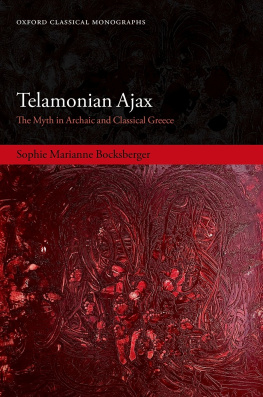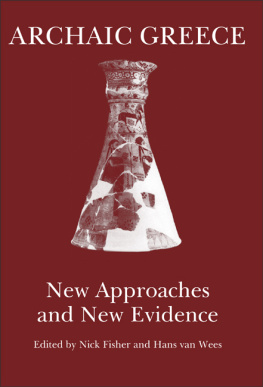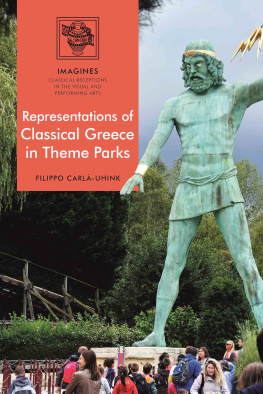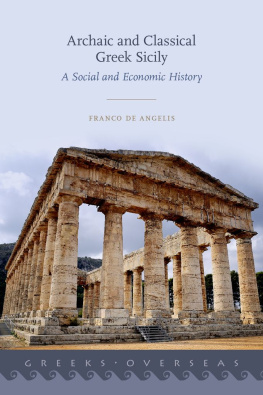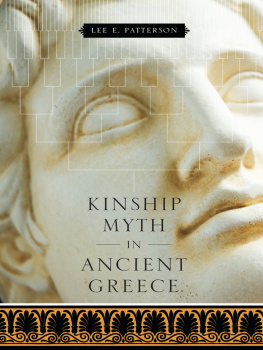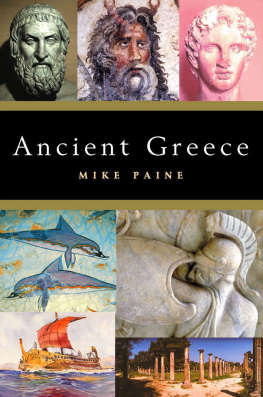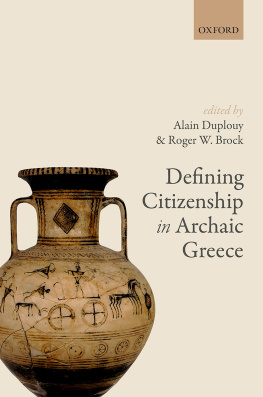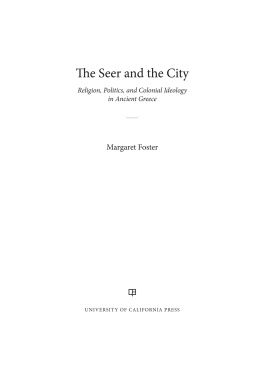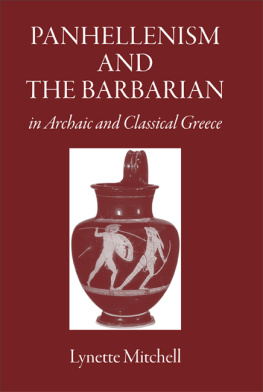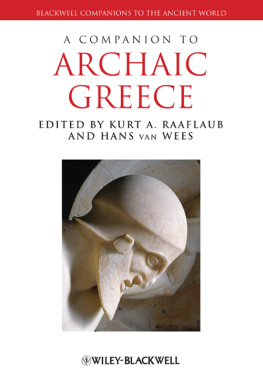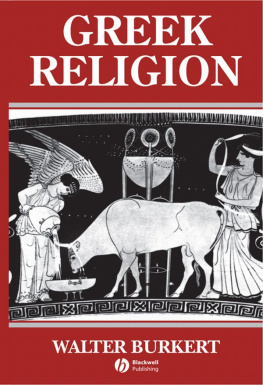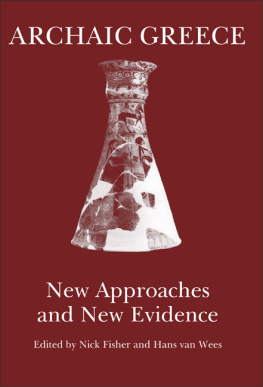Sophie Marianne Bocksberger - Telamonian Ajax: The Myth in Archaic and Classical Greece
Here you can read online Sophie Marianne Bocksberger - Telamonian Ajax: The Myth in Archaic and Classical Greece full text of the book (entire story) in english for free. Download pdf and epub, get meaning, cover and reviews about this ebook. year: 2021, publisher: OxfordUP, genre: Romance novel. Description of the work, (preface) as well as reviews are available. Best literature library LitArk.com created for fans of good reading and offers a wide selection of genres:
Romance novel
Science fiction
Adventure
Detective
Science
History
Home and family
Prose
Art
Politics
Computer
Non-fiction
Religion
Business
Children
Humor
Choose a favorite category and find really read worthwhile books. Enjoy immersion in the world of imagination, feel the emotions of the characters or learn something new for yourself, make an fascinating discovery.
- Book:Telamonian Ajax: The Myth in Archaic and Classical Greece
- Author:
- Publisher:OxfordUP
- Genre:
- Year:2021
- Rating:4 / 5
- Favourites:Add to favourites
- Your mark:
- 80
- 1
- 2
- 3
- 4
- 5
Telamonian Ajax: The Myth in Archaic and Classical Greece: summary, description and annotation
We offer to read an annotation, description, summary or preface (depends on what the author of the book "Telamonian Ajax: The Myth in Archaic and Classical Greece" wrote himself). If you haven't found the necessary information about the book — write in the comments, we will try to find it.
Telamonian Ajax: The Myth in Archaic and Classical Greece — read online for free the complete book (whole text) full work
Below is the text of the book, divided by pages. System saving the place of the last page read, allows you to conveniently read the book "Telamonian Ajax: The Myth in Archaic and Classical Greece" online for free, without having to search again every time where you left off. Put a bookmark, and you can go to the page where you finished reading at any time.
Font size:
Interval:
Bookmark:

Published under the supervision of a Committee of the Faculty of Classics in the University of Oxford
The aim of the Oxford Classical Monographs series (which replaces the Oxford Classical and Philosophical Monographs) is to publish books based on the best theses on Greek and Latin literature, ancient history, and ancient philosophy examined by the Faculty Board of Classics.

Great Clarendon Street, Oxford, OX2 6DP, United Kingdom
Oxford University Press is a department of the University of Oxford. It furthers the Universitys objective of excellence in research, scholarship, and education by publishing worldwide. Oxford is a registered trade mark of Oxford University Press in the UK and in certain other countries
Sophie Marianne Bocksberger 2021
The moral rights of the author have been asserted
First Edition published in 2021
Impression: 1
All rights reserved. No part of this publication may be reproduced, stored in a retrieval system, or transmitted, in any form or by any means, without the prior permission in writing of Oxford University Press, or as expressly permitted by law, by licence or under terms agreed with the appropriate reprographics rights organization. Enquiries concerning reproduction outside the scope of the above should be sent to the Rights Department, Oxford University Press, at the address above
You must not circulate this work in any other form and you must impose this same condition on any acquirer
Published in the United States of America by Oxford University Press
198 Madison Avenue, New York, NY 10016, United States of America
British Library Cataloguing in Publication Data
Data available
Library of Congress Control Number: 2021939900
ISBN 9780198864769
ebook ISBN 9780192633767
DOI: 10.1093/oso/9780198864769.001.0001
Printed and bound by CPI Group (UK) Ltd, Croydon, CR0 4YY
Links to third party websites are provided by Oxford in good faith and for information only. Oxford disclaims any responsibility for the materials contained in any third party website referenced in this work.
To all my loved ones, living or dead.
The debts I owe for the making of this book are far too numerous to be comprehensively listed here. I hope that everyone who has contributed to it already knows how grateful I am for their help and support. I decided instead to use this space to trace back the path that led to the achievement of this book in order to explain how my work on Ajax came to life, and what influenced my thoughts most deeply.
The seeds that sprouted and grew to become this monograph on Telamonian Ajax were planted a long time ago. They started with the long walks I took with my father as a child, walks that I would not tolerate without complaint unless entertained by his fascinating stories about historical figures or events. My fatherhimself a teacher of ancient Greekgave me a taste for genealogies, history, and mythology, made me attentive to questions of causation, interpretation, and language, and most importantly sparked my interest for research by describing his innovative ideas and teaching me to question consensus.
When I studied at the University of Lausanne, I had the chance to follow the lectures and seminars of Claude Sandoz (historical linguistics), and Franois Zufferey (Gallo-Roman philology). I will be forever grateful to both professors for teaching me to think about language and ideas both synchronically and diachronically, and to keep both perspectives present in my mind at the same time. Moreover, the rigour they displayed in their own research, and the most interesting results they achieved through it, made a deep impression on me. They set me a benchmark to which I have aspired ever since.
At the occasion of a seminar on the Iliad led by David Bouvier, I noticed a passage in the poem that intrigued me because I was reading Sophocles Ajax and pondering about Ajaxs reason for refusing Athenas help. In Book , Diomedes severely criticizes Hector for his reliance on the support of gods and even questions his worth as a warrior, although Diomedes himself has just been helped by Athena in an extraordinary manner. She not only healed Diomedes deadly wounds, fought Aphrodite alongside him, but also drew away from his eyes the cloud () that prevents the eyes of mortals from perceiving the gods. I thought I was onto something: the myth of Ajax was somehow concerned with the question of merit. Since certain passages in the Iliad suggested that the assistance of gods on the battlefield could call into question heroic valour, Ajaxs rejection of Athenas help in Sophocles Ajax had perhaps much earlier roots. This seemed to be an entirely novel idea which could shed new light on Telamonian Ajax, and so I decided to pursue doctoral studies in order to explore the issue.
Thanks to the generosity of the Fondation Sophie Afenduli, I spent a semester at UCL, London where I was taught by Fiona Macintosh. I was then awarded a one-year research fellowship to study at the Scuola Normale Superiore di Pisa. There, I met a welcoming community of incredibly dedicated scholars whose work and passion I found immensely stimulating. I had also the opportunity to present some of my work at Glenn Mosts research seminar, and received invaluable feedback which helped me trim and shape further the branches of my doctoral project.
Thanks to the generous support of the Berrow Fondation, the Swiss National Fund, and the Fondation Thodore Lagonico, I was able to pursue my doctoral studies at Lincoln College, Oxford, a most intellectually invigorating place whose hospitable and nurturing climate enabled my ideas to grow and flourish. I benefited from the advice of Bruno Currie, Christopher Pelling, Simon Hornblower, and Gregory Hutchinson at various stages of examination. I am most grateful to Adrian Kelly and Eric Csapo, my examiners, for reading and engaging with my thesis so thoroughly. Their intelligence, erudition, and enthusiasm turned my viva into one of the most thrilling discussion I have ever had. I had the immense privilege to be supervised by Felix Budelmann whose guidance and expertise have been invaluable. I am very thankful for his support, his extreme generosity with his time, and for the detailed criticisms and suggestions he gave me throughout the writing of my doctorate. I have learnt a great deal from him, and hope that I have succeeded in emulating his outstanding intellectual clarity and his rigour.
After receiving my doctorate in 2016, I have worked at Somerville, Brasenose, and Worcester College where I have been blessed with the best colleagues I could ever have dreamt of. Scott Scullion advised me throughout the process of turning my doctorate into this monograph. His input has been invaluable, and his encouragements crucial. In 2018, the Swiss National Fund allowed me to stay at Centre for Classical and Near Eastern Studies of Australia at the University of Sydney, while since 2019 the Humboldt Fellowship and Susanne Gdde have enabled me to join the Institut fr Religionswissenschaft at the Freie Universitt in Berlin. In both places, I have met a most welcoming and dynamic community of scholars. I would like to thank everyone for their support, interest in my research, stimulating discussions, and kindness.
Font size:
Interval:
Bookmark:
Similar books «Telamonian Ajax: The Myth in Archaic and Classical Greece»
Look at similar books to Telamonian Ajax: The Myth in Archaic and Classical Greece. We have selected literature similar in name and meaning in the hope of providing readers with more options to find new, interesting, not yet read works.
Discussion, reviews of the book Telamonian Ajax: The Myth in Archaic and Classical Greece and just readers' own opinions. Leave your comments, write what you think about the work, its meaning or the main characters. Specify what exactly you liked and what you didn't like, and why you think so.

